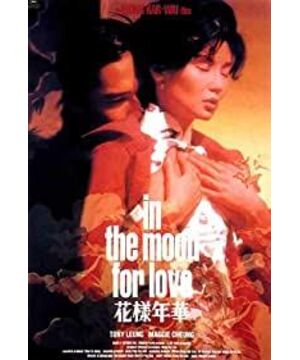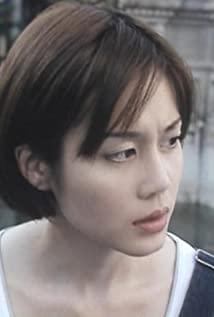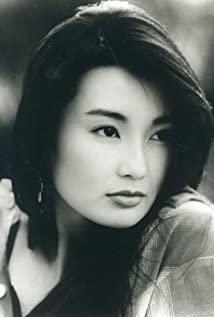This is a movie that makes you feel heavy after watching it, and it is also a movie that makes you think after watching it. Many people watch it just because of that gorgeous cheongsam. Indeed, when the 26 sets of graceful and elegant cheongsam tightly wrapped Maggie Cheung's delicate and graceful curves, it was indeed a kind of beautiful enjoyment. But if you watch this film just to appreciate the beauty of the costumes, it would be a bit of a waste of a good film. A good film is like a cup of clear tea. It tastes nothing at first, but when you taste it carefully, a refreshing fragrance will unknowingly waft through your internal organs. "In the Mood for Love" is such a film. Whether it is the delicate close-up in the shot, the soft light cast by the dim yellow streetlights in the slight rain, or the vivid layers of colors in the whole picture, the eye-catching skills of color matching are the embodiment of director Wong Kar-wai and photographer Du Kefeng's profound skills. There is also the sound art in the film that I have to mention. Even the sound effects of raindrops are so contagious, not to mention the main theme of the film that sounds appropriately when the hero and heroine meet in the corridor for many times - -The lyrical violin music has a hint of depression. These hardware facilities of the film are flawless, and what is more valuable is the soul of the film-the content and plot, as described by Wong Kar-wai with the same ingenuity. It's like a scene that often appears in the film: Zhou Muyun is eating wonton noodles alone, and the camera at this time is fixed on his face for a long time. His eyes were full of anguish and loneliness - for his wife who never came home. At this time, Su Lizhen appeared on the damp stone road with a delicate thermal pot. The camera was clapped by her slender hands and gradually moved up to her chest, but her face was never seen. This open composition can arouse countless imaginations of the audience. She came to the noodle stall with the same portion of wanton noodles, with a pensive melancholy look on her face - for her husband who was not returning. The other pair is enjoying love, and this one is just eating their own wanton noodles. I have to say that at this moment, the director uses a method of interweaving light and dark lines to express the concept of two kinds of love both implicitly and restrainedly. And this kind of mood, which can only be understood after repeated and careful taste, can be described as a classic plot of the film. There is also a memorable scene in the middle and lower part of the film. Zhou Muyun finally plucked up the courage to express the long-repressed feelings to Su Lizhen. But Su avoided it with speechless silence. Zhou saw the ending that the two could not be together. So, he asked Su Lizhen to do something for him—reject him and let him practice bearing the pain, Su agreed. But when Zhou finished saying "you will take care of yourself in the future" and then let go of her hand and walked away without looking back, Su began to feel turbulent. At this time, a long shot was used to close up Su's hand. He twitched at the moment of being released, followed by tightly grasping the other arm, the blue veins on the hand protruded, and a kind of spontaneous pain suddenly appeared in the hand. Then the camera moves to her face: unbearable, sad, impulsive, depressed... all kinds of expressions converge in one place. Immediately afterwards, the scene where Su Fu was crying on Zhou's shoulder appeared. Zhou's hand kept patting her shoulder gently and comfortingly said, "Okay, it's just acting, just acting..." A kind of The sudden eruption of long-suppressed emotions, the director did not deliberately provocative, but expressed gracefully with skilled camera language, but achieved the successful effect of "silence is better than sound at this time". This alone can make many directors who often make actors cry out "I love you!" in a fake way to study hard. At the end of the film, after Zhou Muyun left the sad place of Hong Kong, Su Lizhen came to his room, lit a cigar, didn't smoke it, just left it there and let its smoke linger, circle and disperse. A scent she was once familiar with. She sat in the chair, tears starting to fall. Drop by drop, and finally connect into one piece. At this time, all the background sounds in the movie disappeared, and after a while of loneliness, a man's voice sounded, resounding in Su's heart and echoing in the audience's ears--If there was one more ferry ticket, would you come with me? go? "Speechless... Maybe everything should be the English translation of the film: In the mood of love is just the "love in the mood", in the faded Mood for Love... In the Mood for Love" It is called a nostalgic classic. As far as the story told in the film is concerned, it is old and ordinary, nothing new, it is nothing more than a love story about extramarital affairs; It can be said to be simple and bland. So, why can such a film with an ordinary story and a simple plot be called a classic? The key lies in the ingenious and unique expression techniques used by director Wong Kar-wai in the film. Through these artistic techniques This ordinary story is endowed with a profound, novel and refined theme, which makes the film achieve the perfect combination of form and content. "The sudden outbreak of a long-suppressed emotion, the director did not deliberately provocative, but only expressed it gracefully with skilled camera language, but obtained the successful effect of "silence is better than sound at this time". This alone can make Many actors at every turn make the actor cry out, "I love you! At the end of the film, after Zhou Muyun left the sad place of Hong Kong, Su Lizhen came to his room, lit a cigar, didn't smoke it, just left it there and let its smoke linger, circle and disperse. A kind of cigar she was familiar with She sat on the chair, and her tears began to fall. Drop by drop, they finally joined together. At this time, the background sound in the movie disappeared, and after a while of loneliness, a man's voice sounded, resounding in Su's heart, also Reverberating in the ears of the audience -- if there is one more ferry ticket, will you go with me?" Silent... Maybe everything should be the English translation of the film: In the mood of love It's just That "love in the mood", in the Mood for Love that faded away... In the Mood for Love is called a nostalgic classic. As far as the story told in the film is concerned, it is old and ordinary, nothing new, it is nothing more than a love story about an extramarital affair; as far as the plot of the film is concerned, it is neither twisty nor exciting, it can be said to be simple and bland. So, why can such a film with an ordinary story and a simple plot be called a classic? The key lies in the ingenious and unique expression techniques used by director Wong Kar-wai in the film. Through these artistic techniques, the ordinary story is given a profound and novel theme, which makes the film achieve the perfect form and content. combine. "The sudden outbreak of a long-suppressed emotion, the director did not deliberately provocative, but only expressed it gracefully with skilled camera language, but obtained the successful effect of "silence is better than sound at this time". This alone can make Many actors at every turn make the actor cry out, "I love you! At the end of the film, after Zhou Muyun left the sad place of Hong Kong, Su Lizhen came to his room, lit a cigar, didn't smoke it, just left it there and let its smoke linger, circle and disperse. A kind of cigar she used to be familiar with She sat on the chair, and her tears began to fall. Drop by drop, they finally joined together. At this time, all the background sounds in the movie disappeared, and after a while of loneliness, a man's voice sounded, resounding in Su's heart, also Reverberating in the ears of the audience -- if there is one more ferry ticket, will you go with me?" Silent... Maybe everything should be the English translation of the film: In the mood of love It's just That "love in the mood", in the Mood for Love that faded away... In the Mood for Love is called a nostalgic classic. As far as the story told in the film is concerned, it is old and ordinary, nothing new, it is nothing more than a love story about an extramarital affair; as far as the plot of the film is concerned, it is neither tortuous nor exciting, it can be said to be simple and bland. So, why can such a film with an ordinary story and a simple plot be called a classic? The key lies in the ingenious and unique expression techniques used by director Wong Kar-wai in the film. Through these artistic techniques, this ordinary story is given a profound and novel theme, which makes the film achieve the perfect form and content. combine. In the Mood for Love is known as a nostalgic classic. As far as the story told in the film is concerned, it is old and ordinary, nothing new, it is nothing more than a love story about an extramarital affair; as far as the plot of the film is concerned, it is neither twisty nor exciting, it can be said to be simple and bland. So, why can such a film with an ordinary story and a simple plot be called a classic? The key lies in the ingenious and unique expression techniques used by director Wong Kar-wai in the film. Through these artistic techniques, the ordinary story is given a profound and novel theme, which makes the film achieve the perfect form and content. combine. In the Mood for Love is known as a nostalgic classic. As far as the story told in the film is concerned, it is old and ordinary, nothing new, it is nothing more than a love story about an extramarital affair; as far as the plot of the film is concerned, it is neither twisty nor exciting, it can be said to be simple and bland. So, why can such a film with an ordinary story and a simple plot be called a classic? The key lies in the ingenious and unique expression techniques used by director Wong Kar-wai in the film. Through these artistic techniques, the ordinary story is given a profound and novel theme, which makes the film achieve the perfect form and content. combine.
View more about In the Mood for Love reviews











